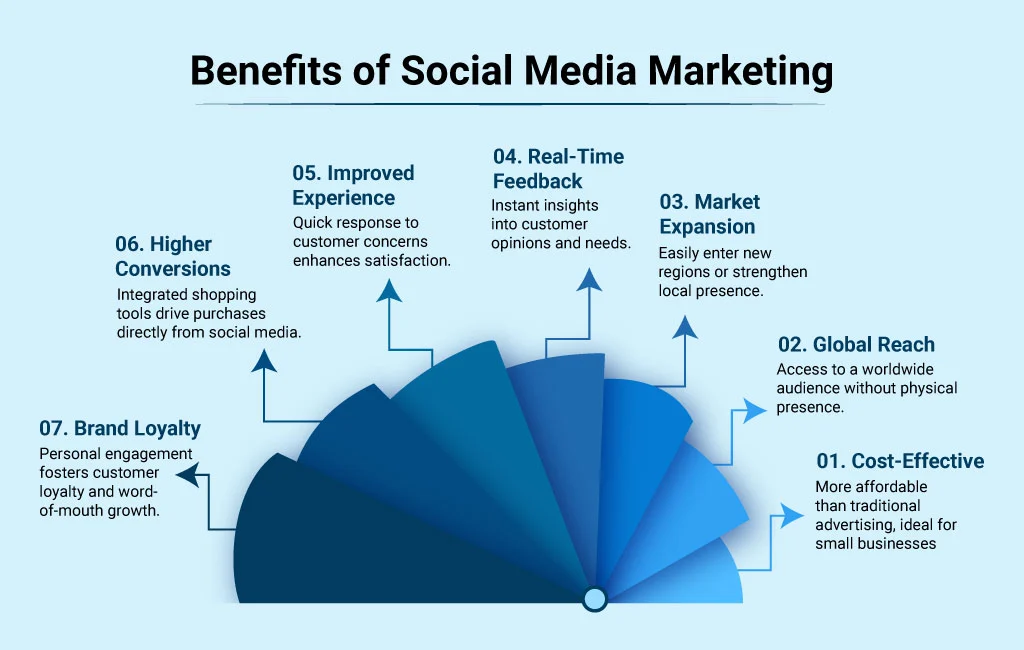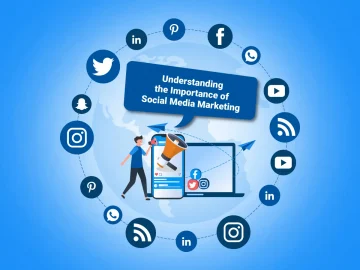The world of social media is no longer just a digital playground for sharing photos and quick updates—it has transformed into a dynamic space where brands can create, communicate, and connect with audiences on an unprecedented level. For businesses, the importance of social media marketing cannot be overstated. Today, every brand, big or small, recognizes that a presence on social media isn’t just beneficial; it’s essential. Social media marketing has the potential to elevate brand awareness, build customer loyalty, and drive growth through strategic content and interactions that directly reach target audiences.
This guide will walk you through the essentials of social media marketing, explaining its significance, how it impacts business growth, and actionable tips for creating a successful social media marketing strategy. With billions of active users, social media platforms have become the ultimate marketplace for businesses to reach consumers, making social media marketing one of the most influential tools in the modern marketer’s toolkit. So, why exactly is social media marketing so essential for businesses today? Let’s dive in and find out.

What is Social Media Marketing?
Social media marketing refers to the strategic use of social media platforms like Facebook, Instagram, Twitter, LinkedIn, and TikTok to promote products, services, or content. But effective social media marketing goes beyond merely posting an occasional update or running ads. At its core, it involves creating a well-thought-out social media strategy that defines goals, understands the audience, and uses engaging content to create meaningful connections.
Key Components of Social Media Marketing
A strong social media strategy is built on several core components that together create a cohesive and impactful presence. First, platform selection is crucial. Each platform serves different purposes and audiences, so understanding where your target demographic spends their time is essential. TikTok, for instance, is a go-to for reaching younger users with fast-paced, visually-driven content, while LinkedIn is ideal for professional networking and is especially effective for B2B businesses. Choosing the right platform ensures that your efforts reach the people most likely to engage with and respond to your brand. This highlights the importance of social media marketing, as selecting the right channels amplifies your message and drives meaningful connections.
Content creation is the next pillar, as social media thrives on a steady stream of relevant, engaging material that maximizes social media impact. A well-rounded content strategy incorporates a mix of posts, including visuals, videos, stories, and interactive elements that invite audience participation. Consistency is key—posting regularly with content that resonates keeps your audience interested and helps your brand stay top of mind. Furthermore, varied content allows you to reach users who may prefer different types of media, such as video or stories, creating a more engaging experience overall.
Equally important is engagement with the audience. Social media isn’t just about broadcasting a message; it’s a conversation. An effective social media strategy goes beyond simply posting by actively interacting with followers. This includes responding to comments, participating in relevant conversations, and even sharing user-generated content. This two-way interaction fosters a sense of community, which helps to build trust and loyalty over time. Customers who feel acknowledged and valued are more likely to become brand advocates, amplifying your reach organically.
Finally, analytics and performance tracking are essential for refining your approach. By analyzing metrics such as engagement rates, reach, and conversions, you can gain valuable insights into what resonates with your audience and what doesn’t. These insights allow for data-driven adjustments to your strategy, so you’re constantly improving and optimizing your social media efforts.
In summary, a robust social media marketing strategy goes beyond just posting content. It’s about selecting the right platform, consistently creating engaging content, building relationships through active engagement, and continually refining your approach based on data. The importance of social media marketing lies in its ability to integrate these elements effectively, transforming casual followers into loyal, lifelong customers, strengthening brand loyalty, and fostering meaningful connections.
The Importance of Social Media Marketing for Businesses
In today’s digital world, the importance of social media marketing cannot be overlooked. Social media platforms are not just channels for brands to advertise; they are powerful tools for building relationships, increasing visibility, and even driving customer loyalty. Here are the key reasons why social media marketing is critical for businesses:

1. Increased Brand Visibility and Reach
With billions of active users across platforms like Facebook, Instagram, and TikTok, social media offers businesses unmatched reach. By maintaining a presence on these platforms, brands can increase their visibility and stay top-of-mind for consumers. Every post or story offers an opportunity to reach new people, reminding existing customers of the brand’s presence and building awareness among potential customers.
2. Brand Recognition and Loyalty
The more people interact with your brand, the more familiar they become with it. Social media marketing helps establish brand identity and keep it consistent, which is essential for creating a memorable and recognizable brand. Over time, consistent exposure helps to build brand loyalty, making social media a vital component in long-term customer retention.
3. Enhanced Customer Engagement
Unlike traditional marketing methods, social media enables real-time interactions. Businesses can use social media to connect directly with their audience, answer questions, provide support, and receive feedback. This two-way communication builds trust and makes customers feel valued, as they know they’re being heard.
4. Driving Traffic and Sales
Social media is an excellent way to drive traffic to a company’s website or product pages. Many platforms now allow direct links to online stores or services, making it easier for customers to explore, shop, and make purchases. Features like Facebook’s Marketplace, Instagram Shopping, and Pinterest’s “Shop the Look” pins are turning social media into a one-stop shop for online consumers.
5. Cost-Effective Advertising
Compared to traditional advertising, social media marketing is extremely cost-effective. Organic reach can be substantial if you have a dedicated audience, and even paid ads can be budget-friendly. Social media advertising platforms offer sophisticated targeting options, enabling businesses to reach specific audiences based on location, interests, behaviors, and demographics, making ad spending highly efficient.
Social media marketing is essential in today’s competitive business landscape. It amplifies visibility, nurtures customer relationships, and ultimately drives growth, proving the importance of social media marketing in achieving success and staying ahead in a rapidly evolving market.
The Impact of Social Media Marketing on Business Growth
The impact of social media awareness on business growth is profound. Through effective social media marketing, businesses can foster stronger customer relationships, build brand credibility, and gain traction in crowded marketplaces. Let’s explore how social media drives business growth:

1. Building Awareness on a Massive Scale
Social media provides a unique opportunity to grow brand awareness on a massive scale. Businesses can reach an audience far beyond their local market, connecting with users across different regions and even countries. Each post, ad, or shared story has the potential to reach thousands of people, increasing brand recognition significantly.
2. Fostering Word-of-Mouth Promotion
Social media encourages organic sharing, where customers can share their positive experiences with friends and family. Word-of-mouth promotion is highly trusted among consumers, and when people recommend a brand on social media, it can have a powerful effect on business growth. Customer reviews, user-generated content, and testimonials can all be shared on social platforms to amplify positive experiences.
3. Gaining Valuable Consumer Insights
Through social media, businesses gain real-time feedback from customers about their products, services, and marketing campaigns. Social listening, or monitoring social media conversations about your brand or industry, provides insights that help refine marketing strategies, improve products, and align with customer expectations.
4. Strengthening Search Engine Optimization (SEO)
While social media does not directly impact SEO, an active social media presence can drive more traffic to your website, which indirectly influences search engine rankings. By sharing content and links to your website, you’re creating more opportunities for users to find your business organically.
5. Establishing Brand Authority and Trust
Social media allows brands to showcase their expertise and knowledge. By sharing valuable content, engaging in meaningful discussions, and offering helpful insights, businesses can establish themselves as authorities in their industry. This trust-building aspect contributes to long-term customer loyalty and brand credibility.
With these growth opportunities, it’s clear that social media marketing is a powerful driver for long-term business success, making it a crucial part of any company’s growth strategy.
Tips for Effective Social Media Marketing
Creating an effective social media marketing strategy requires a blend of creativity, consistency, and insight into what resonates with your audience. Here are some essential social media marketing tips to help you achieve your goals:

1. Know Your Audience
Understanding your audience’s interests, behaviors, and preferences is critical. Conduct research to identify where your target audience spends the most time and what kind of content they engage with. Tailor your social media strategy to meet their needs and preferences.
2. Set SMART Goals
Your goals should be Specific, Measurable, Achievable, Relevant, and Time-bound (SMART). Are you aiming to increase followers, boost engagement, or drive traffic to your website? Clear goals provide a roadmap for your efforts and make it easier to evaluate your success.
3. Develop a Content Calendar
A content calendar helps you plan your posts, ensuring consistent and varied content. By scheduling posts in advance, you can maintain regular engagement without last-minute scrambling. Calendars also allow you to plan seasonal and timely content, capitalizing on events and holidays that matter to your audience.
4. Invest in Quality Visuals
Visuals play a significant role in grabbing attention on social media. Whether it’s images, graphics, or videos, high-quality visuals can increase engagement and make your brand more memorable. Tools like Canva, Adobe Spark, and even smartphone cameras can help you create professional-looking visuals on a budget.
5. Leverage User-Generated Content
Encourage customers to share their experiences with your brand on social media. User-generated content (UGC) is authentic and relatable, helping to build trust among potential customers. Many brands create hashtags to curate UGC and give followers an easy way to showcase their love for the brand.
6. Optimize Content for Each Platform
Each social media platform has unique features and audience preferences. Avoid a “one-size-fits-all” approach. For example, long captions work better on Instagram, while concise, punchy messages perform well on Twitter. Tailoring content to each platform helps you maximize engagement.
7. Engage and Build Relationships
Don’t just post and forget—actively engage with your followers by responding to comments, answering questions, and participating in discussions. Engaging with your audience shows you value their opinions and fosters a sense of community around your brand.
8. Utilize Analytics to Track Progress
Most social media platforms offer analytics tools that provide insights into post performance, engagement rates, and audience demographics. Use this data to track progress, identify trends, and adjust your strategy based on what’s working best.
By following these tips, brands can create a well-rounded, effective social media strategy that resonates with audiences and drives meaningful engagement.
Benefits of Social Media Marketing for Businesses
Social media marketing has evolved far beyond simple engagement tactics; it’s now a powerful tool that delivers multiple social marketing benefits with tangible impact on a company’s bottom line. For businesses of all sizes, from startups to global enterprises, an effective social media strategy is critical to maintaining competitive edge and maximizing reach.

One major benefit is that social media marketing is incredibly cost-effective. Unlike traditional advertising, which requires substantial budgets, social media allows brands to engage with potential customers through both organic posts and affordable ads. For small businesses and startups, this low-cost entry point provides invaluable leverage to compete with larger brands.
Furthermore, cost-effective social media marketing opens doors to a wider audience reach. Platforms like Facebook, Instagram, and LinkedIn provide businesses with a global reach without the need for a physical presence in each market. Whether you’re a local company looking to expand into new regions or an established brand aiming to solidify presence in specific areas, social media makes reaching diverse audiences feasible and efficient.
Another valuable aspect of social media marketing is the ability to receive real-time customer feedback. Social media enables businesses to gain instant insights into customer opinions, needs, and preferences, allowing companies to address concerns quickly, refine their offerings, and ultimately improve the customer experience. This immediate feedback loop helps businesses adapt and align with what consumers want, fostering better brand-consumer alignment.
Social media also contributes to higher conversion rates by providing a seamless path from brand discovery to purchase. Platforms now feature shopping tools, allowing users to purchase products directly without leaving the app. This creates a smooth, integrated shopping experience that helps turn casual browsers into loyal buyers.
Finally, social media marketing plays a crucial role in building brand loyalty and advocacy. By interacting with customers on a personal level, brands can foster deeper connections that encourage loyalty. Customers who feel connected to a brand are more likely to recommend it to others, driving growth through word-of-mouth marketing.
These benefits underscore the vital role social media marketing plays in both attracting attention and nurturing lasting customer relationships that lead to retention and growth. Embracing a strong social media strategy is not just an option for modern businesses; it highlights the importance of social media marketing as an essential component for achieving sustained success in today’s competitive landscape.
How Do You Measure the Success of Social Media Marketing?
To understand how effective your social media efforts are, it’s essential to track specific metrics. Social media marketing analytics offer insights into the performance of each post, campaign, and platform. Here’s how you can measure success:

Engagement Rate: Engagement measures how actively users interact with your content. High engagement rates indicate that your content resonates with your audience and encourages interaction.
Reach and Impressions: Reach refers to the number of unique users who see your content, while impressions indicate the total number of views. These metrics provide insights into content visibility and the overall reach of your brand.
Click-Through Rate (CTR): CTR measures the percentage of people who clicked on a link in your post. High CTRs show that your content successfully drives users to take action.
Conversion Rate: Conversion rate measures how many users took a desired action after viewing your content, such as signing up for a newsletter or making a purchase. This metric shows the direct impact of social media on sales and other business goals.
Follower Growth: While it’s not the only metric to consider, a growing follower count can indicate increased brand awareness and interest.
By tracking these metrics, businesses can assess their social media performance and refine their strategies to maximize effectiveness.
How Can You Overcome Challenges in Social Media Marketing?
Overcoming challenges in social media marketing is essential for brands aiming to maximize social media audience engagement and maintain a strong online presence. While social media offers immense benefits, businesses often encounter obstacles that can hinder their success.
One common challenge is low engagement, where posts may not receive the expected likes, comments, or shares. To address this, brands should focus on interactive content. Asking questions, creating polls, and running contests are all effective strategies that encourage followers to engage directly, thereby boosting post visibility.
Another hurdle is content fatigue. Followers may lose interest if they see the same type of content repeatedly. To prevent this, brands should diversify their approach by experimenting with videos, stories, live streams, and other formats. Mixing up content keeps the feed fresh and helps sustain audience interest.
Handling negative feedback is another critical aspect of social media marketing. Brands should address criticism professionally and promptly, as transparent, empathetic responses show customers that their concerns are taken seriously. This can turn a potentially damaging interaction into an opportunity to build trust.
Finally, platform algorithm changes can significantly impact a brand’s visibility on social media. Algorithms often prioritize certain types of content, making it challenging for organic posts to reach a wide audience. To counteract this, brands can encourage more direct engagement from followers and consider using paid ads to amplify their content’s reach.
By adopting these strategies, businesses can effectively navigate the challenges of social media marketing and recognize the importance of social media marketing in building stronger connections with their audience, creating a resilient, adaptable social media presence.
Future Trends in Social Media Marketing
As technology evolves, so does social media. Staying ahead of social media future trends ensures that your strategy remains relevant. Here’s what the future holds for social media marketing:

More Short-Form Video Content: Short, engaging videos like those on TikTok and Instagram Reels will continue to dominate, offering brands new ways to capture attention quickly.
Augmented Reality Experiences: AR filters and virtual try-ons are gaining traction, especially in the e-commerce sector. This trend will allow brands to create immersive experiences that help customers visualize products.
Rise of Social Commerce: Social commerce is expected to grow, as platforms continue to develop shopping features. Brands that embrace this trend can offer a seamless shopping experience directly on social media.
Greater Emphasis on Community and Privacy: Users are moving toward private groups and communities for more personal interactions. Brands that create or participate in online communities can foster loyalty and deepen connections.
Increased Use of Artificial Intelligence (AI): AI tools are being integrated into social media platforms to offer better insights, automate responses, and personalize content for users.
By keeping these trends in mind, businesses can position themselves to adapt and thrive as social media evolves.
Conclusion
The importance of social media marketing for businesses is undeniable. Social media enables brands to connect with their audience, foster loyalty, and drive growth through engaging, targeted, and meaningful interactions. Whether it’s expanding reach, increasing engagement, or boosting sales, social media marketing is an essential component of modern business success. By leveraging social media effectively, brands can build a community, establish trust, and create lasting customer relationships in an increasingly digital world.
Frequently Asked Questions
Social media marketing helps businesses reach people where they already spend a lot of their time—online. It builds brand awareness, strengthens customer relationships, and creates opportunities to turn followers into loyal customers through consistent and engaging content.
The best platform depends on your audience and business goals. For example, Facebook is great for community building and ads, Instagram works well for visual branding, LinkedIn is ideal for B2B marketing, TikTok helps reach younger audiences with short videos, and Twitter is effective for real-time updates and conversations.
There’s no single perfect number, but consistency matters more than frequency. Most businesses see good results by posting 3–5 times per week while maintaining quality and relevance.
Absolutely. Social media is one of the most cost-effective marketing tools available. Even with a small budget, businesses can grow their visibility, connect with local audiences, and compete with larger brands.
Some common mistakes include posting inconsistently, ignoring audience engagement, using the same content on every platform, and focusing only on selling instead of providing value.








